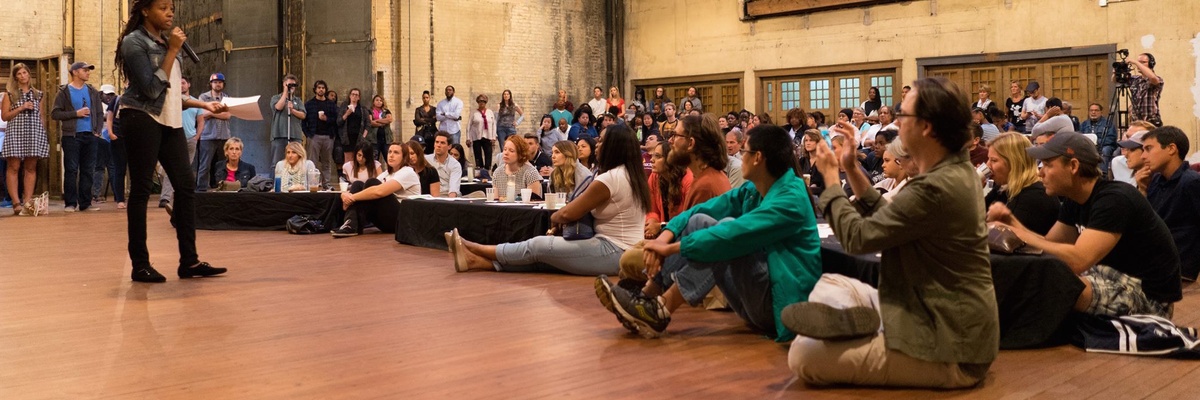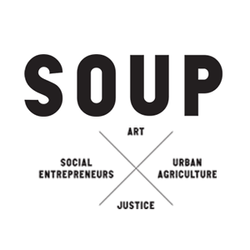Diversity is key in cultivating a group of people to work on SOUP. Members of the planning committee should either live or work (or both) in the community so that there is a real understanding of the needs of that area - this transcends the scope of the SOUP. We try to remember that the audience will reflect those that planned the dinner.
Think about members from different experiences and perspectives:
- Young and old
- Different social and ethnic groups
- Nonprofit organizations
- Religious groups
- Business leaders
- Block clubs
Artists, farmers, coffee shop goers, and lovers of the neighborhoods they live in are all welcome and have a place at our table. The goal is to sit together and be a part of changing the ways we think about democracy, community, development, and safe space.
THIS IS ABOUT COLLABORATION
When you’re building a team, please remember that the implementation of SOUP requires a safe space in order to build toward an event that will also feel safe for the presenters and diners. Vulnerability is key as a team, so be kind with one another and experiment. This may require a strong facilitator; remember that while building a team.
THE COMMITMENT
You should be committed to the mission of promoting community-based development through crowdfunding, creativity, collaboration, democracy, trust and fun. That’s it.
We are committed to making SOUP a collaborative project that engages different parts of the community; this extends to, and is possibly most important in, the planning and implementation. Having a dedicated committee that takes on different roles in the process is essential to the success of each event and the concept in the community.
We have roles that have worked for Detroit SOUP, but if your community needs something different, empower the members of your committee to make those kinds of decisions with additions or subtractions.
ROLES:
LEADER / FACILITATOR / ENCOURAGEMENT DIRECTOR
The Leader is the manager and facilitator of each committee meeting and keeps track of the timeline and each member’s responsibilities. They need to plan, build agendas, and facilitate each meeting. The Leader must be a skilled facilitator and be comfortable contacting committee members one-on-one to follow up on commitments and tasks.
SECRETARY / NOTE TAKER / DOCUMENTER
The Secretary takes notes at each committee meeting and works closely with the Leader to clearly highlight decisions and commitments made at each meeting. It’s best if this person can email notes to the group within 48 hours to make sure everyone stays up-to-date and is prepared for each upcoming meeting. It is important that this person documents how much money is raised at each event and who the winners, presenters, and proposal submissions came from for future reference. In some cases, the Leader assumes this role as well.
OUTREACH CHAIR / MARKETING / STORYTELLER
Outreach should be the responsibility of the whole committee, however, the Outreach Chair is the organizer and manager dedicated to local outreach. At a planning meeting before the dinner, the committee should brainstorm local organizations, businesses, churches, events, etc. that they can reach out to for the event. Each member should commit to doing outreach to a few organizations on the list and the Outreach Chair will manage these commitments. They are responsible for making and printing a SOUP flyer, and creating a social media page to promote the event. At each dinner, the committee should collect a list of emails to notify attendees of future SOUP dinners and other opportunities.
PROPOSAL CHAIR / IDEA FINDER
Having one person be the main point of contact for people submitting proposals can be very helpful, especiallly as the dinner date comes close. The Proposal Chair will work closely with the Outreach Chair to find ideas in the community. This person will check in with proposal drop-off locations and manage an online proposal submission form. At least a week before the dinner, the board will need to decide which proposals should present at the dinner. The proposal chair should facilitate this process at the meeting and be the main point of contact for all proposal submitters.
This means:
- Notify winners they will be presenting at the dinner and what to expect.
- Notify proposal submitters not selected to present and offer a few points of feedback, encourage them to attend the event (perhaps even to bring food and speak), and resubmit their proposal in the future.
- At each dinner, the proposal chair should check-in with each presenter before the dinner begins to make sure they know the agenda, which order they’re speaking in, and to answer any last-minute questions presenters may have before they speak.
FOOD CHAIR / HEAD CHEF / VOLUNTEER WRANGLER
SOUP was conceived as a potluck where attendees are encouraged to bring a dish to share. In practice, this is an opportunity for people to make a 60-second announcement in front of all attendees to promote an organization, business, or upcoming community event. To ensure enough food is present at the dinner, the Food Chair often works with other committee members. They are responsible for getting enough food donations for the dinner, communicating with food-makers before the event, managing the list of potential food-makers from a sign-up sheet at each event, and helping set up and manage the food table during the dinner.
ART CHAIR / BEAUTY SEEKER
To promote art and creativity in our communities, the Artist Chair is responsible for securing an artist feature for each SOUP. This person should also be responsible for making sure there is music (even just plugging in an iPod is fine) when people come in and during the dinner (unless this is part of the artist performance).
DIVERSITY CHAIR / INCLUSION ADVOCATE
The Diversity Chair should be engaged with different aspects of your community and willing to speak out about important issues facing your events. As well, this person should work with the committee and the Leader to find ways to be more inclusive. This could include food choices, audience members, outreach, and other important conversations that arise.
NOTE: Many of these roles and responsibilities are shared throughout the process of planning and implementing SOUP dinners, but empowering your committee to take the lead on certain aspects will instill a sense of ownership over the success of this project in your community. SOUP shouldn’t feel like a lot of work, it should be fun and rewarding.









 "I am excited that you want to make the dinner happen in your community! That
means we did our job in thinking that SOUP is approachable, intuitive, and
human-friendly. Thank you for being a fellow human looking for equitable safe
space supported by your fellow neighbors."
- Amy Kaherl, Director, Detroit SOUP
"I am excited that you want to make the dinner happen in your community! That
means we did our job in thinking that SOUP is approachable, intuitive, and
human-friendly. Thank you for being a fellow human looking for equitable safe
space supported by your fellow neighbors."
- Amy Kaherl, Director, Detroit SOUP
